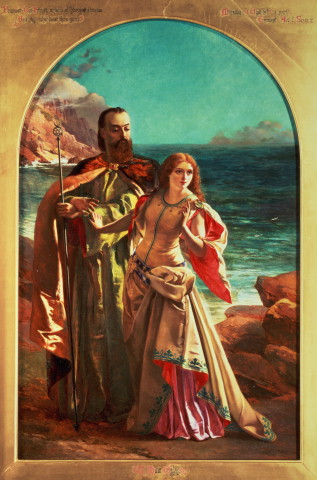
Radio drama is a dramatized, purely acoustic performance. With no visual component, radio drama depends on dialogue, music and sound effects to help the listener imagine the characters and story: "It is auditory in the physical dimension but equally powerful as a visual force in the psychological dimension." Radio drama includes plays specifically written for radio, docudrama, dramatized works of fiction, as well as plays originally written for the theatre, including musical theatre, and opera.

Prospero is a fictional character and the protagonist of William Shakespeare's play The Tempest. Prospero is the rightful Duke of Milan, whose usurping brother, Antonio, had put him to sea on a "rotten carcass" of a boat to die, twelve years before the play begins. Prospero and Miranda had survived and found exile on a small island. He has learned sorcery from books, and uses it while on the island to protect Miranda and control the other characters.

BBC Radio is an operational business division and service of the British Broadcasting Corporation. The service provides national radio stations covering the majority of musical genres, as well as local radio stations covering local news, affairs and interests. It also oversees online audio content.

Sir Arthur John Gielgud, was an English actor and theatre director whose career spanned eight decades. With Ralph Richardson and Laurence Olivier, he was one of the trinity of actors who dominated the British stage for much of the 20th century. A member of the Terry family theatrical dynasty, he gained his first paid acting work as a junior member of his cousin Phyllis Neilson-Terry's company in 1922. After studying at the Royal Academy of Dramatic Art he worked in repertory theatre and in the West End before establishing himself at the Old Vic as an exponent of Shakespeare in 1929–31.
Albert Eric Maschwitz OBE, sometimes credited as Holt Marvell, was an English entertainer, writer, editor, broadcaster and broadcasting executive.

Broadcasting House is the headquarters of the BBC, in Portland Place and Langham Place, London. The first radio broadcast from the building was made on 15 March 1932, and the building was officially opened two months later, on 15 May. The main building is in Art Deco style, with a facing of Portland stone over a steel frame. It is a Grade II* listed building and includes the BBC Radio Theatre, where music and speech programmes are recorded in front of a studio audience.

Norman Richard Collins was a British writer, and later a radio and television executive, who became one of the major figures behind the establishment of the Independent Television (ITV) network in the UK. This was the first organisation to break the BBC's broadcasting monopoly when it began transmitting in 1955.

Theatre 625 is a British television drama anthology series, produced by the BBC and transmitted on BBC2 from 1964 to 1968. It was one of the first regular programmes in the line-up of the channel, and the title referred to its production and transmission being in the higher-definition 625-line format, which only BBC2 used at the time.

BBC television dramas have been produced and broadcast since even before the public service company had an officially established television broadcasting network in the United Kingdom. As with any major broadcast network, drama forms an important part of its schedule, with many of the BBC's top-rated programmes being from this genre.
Val Henry Gielgud was an English actor, writer, director and broadcaster. He was a pioneer of radio drama for the BBC, and also directed the first ever drama to be produced in the newer medium of television.
Mrs Dale's Diary was the first significant BBC radio serial drama. It was first broadcast on 5 January 1948 on the BBC Light Programme, later BBC Radio 2; it ran until 25 April 1969. A new episode was broadcast each weekday afternoon, with a repeat the following morning. A few days after the final episode, a new serial drama, Waggoners' Walk, took over the time slot.
Dick Barton – Special Agent is a radio thriller serial that was broadcast in the BBC Light Programme between 7 October 1946 and 30 March 1951. Produced and directed by Raymond Raikes, Neil Tuson, and Charles Lefaux, it was aired in 15-minute episodes at 6.45 each weekday evening. From 11 January 1947 an additional "omnibus" edition repeated all of the week's programmes each Saturday morning between 11.00 and 12.00. In all, 711 episodes were produced and the serial achieved a peak audience of 20 million. Its end was marked by a leading article in The Times.

Emery Bonett was the pen name of Felicity Winifred Carter, an English writer and playwright. Her books were made into films. She wrote several mystery, suspense and detective novels in collaboration with her husband, John Bonett, published during the 1940s-60s.

Saville Esmé Percy was an English actor who specialized in the plays of G.B. Shaw and appeared in 40 films between 1930 and 1956. He was born in London and died in Brighton.
Lance Sieveking was an English writer and pioneer BBC radio and television producer. He was married three times, and was father to archaeologist Gale Sieveking (1925–2007) and Fortean-writer Paul Sieveking (1949–).

BBC Archives are collections documenting the BBC's broadcasting history, including copies of television and radio broadcasts, internal documents, photographs, online content, sheet music, commercially available music, BBC products, press cuttings, artifacts and historic equipment. The original contents of the collections are permanently retained but are in the process of being digitised. Some collections are being uploaded to the BBC Archives section of the BBC Online website for visitors to view. The archive is one of the largest broadcast archives in the world, with over 15 million items.

Death at Broadcasting House, also known as Death at a Broadcast, is a 1934 British mystery film directed by Reginald Denham and starring Ian Hunter, Austin Trevor, Henry Kendall, and Jack Hawkins.
This is a list of events in British radio during 1981.
Laurence Duval Gilliam, OBE was a BBC radio producer.












